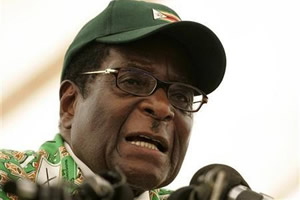Chavunduka: Death deals Zim a blow
spokesman Themba Chavunduka said Dr Chavunduka’s body was expected in the country last night.
A church service will be held at All Souls Church in Mt Pleasant, Harare.
Mourners are gathered at 78 Greengrove Drive, Greendale.
In 1982, Dr Chavunduka was appointed permanent secretary in the then Ministry of Natural Resources.
He also served on the boards of the Agricultural Marketing Authority, Veterinary Council of Zimbabwe and on Parliament’s Public Accounts Committee, among other things.
Dr Chavunduka wrote 15 books on animal husbandry in Shona and English and these were also translated into Ndebele.
He was surrounded by his wife, daughters and grandchildren during the time of his death.
Dr Chavunduka had been ill for several years after a 1993 Christmas Eve road accident in Harare.
He never fully recovered.
He was born on April 27, 1934 at St Augustines Mission, Penhalonga.
He was born to Solomon Chavunduka from Hwedza and Lillian Sanyangore from Makoni in Rusape district.
He was the seventh child in a family of nine, all of whom are deceased with the exception of his elder brother, Professor Gordon Lloyd Chavunduka.
Dr Chavunduka married Jane Chiza in Scotland, UK, during his studies.
They have four children (Schona, born in Scotland; Mark, Fiona and Moira).
He is survived by his wife, three daughters, 10 grandchildren and a great grandchild.
His son, Mark, a well-known journalist, passed away in 2002.
Dr Chavunduka started his education in Dowa, an African Farming Purchase area in Rusape district.
It was after his father had retired there in 1939 from an agriculture-teaching job at St Augustines Mission, Penhalonga.
His father was to have an influence on Dr Chavunduka’s choice of professional career.
There were no schools in Dowa at the time, but Dr Chavunduka’s parents were determined to have their children educated.
His father hired a teacher and arranged for classes under a muhacha tree.
His parents started building classrooms out of pole and dagga and grass thatched roofs, which was the foundation of modern day Dowa Council Primary and Secondary schools.
Dr Chavunduka also studied at St Mary’s Hunyani, in Harare, Domboshawa Government School as well as St Augustine’s Secondary School.
He did his matriculation at Adams College, Natal, Durban and went on to study for a Bachelor of Science Degree (Zoology and Botany) at Roma University College (now University of Lesotho.)
In 1959, he went to University of Edinburgh in Scotland, where he studied Veterinary Medicine.
He was the first African veterinary surgeon in Zimbabwe when he graduated in 1964 and returned to the country.
He served Government in different capacities that include Government Veterinary Officer at the Veterinary Research Laboratory, Deputy Secretary, Ministry of Agriculture (Professional and Technical Service), and Permanent Secretary, Ministry of Natural Resources.
He was also a member of Royal College of Veterinary Surgeons (Edinburgh) and received a World Veterinary Day Commemorative Award Citation (April 30, 2011) in recognition of his exceptional accomplishments, by a first black veterinary surgeon in Zimbabwe.
In 1983, he retired from public office and went into private practice, after which he bought a veterinary surgery at Newlands in Highlands.
Dr Chavunduka later worked for the World Lutheran Foundation in Zimbabwe, the Agriculture Rural Development Authority (Arda) and also as a consultant for the Botswana Meat Company.
He served on the boards of the Agricultural Marketing Authority, Veterinary Council of Zimbabwe and on the Public Accounts Parliamentary Committee, among others.
He was a Member of Parliament for Makoni North Province (elected on a Zanu-PF ticket in March 1990) and held the post of the party’s deputy secretary for production and labour in Manicaland Province.
Dr Chavunduka was interested in farming.
He bought a farm in Msengezi African Purchase area in the early 1970s.
He later bestowed it to his nephew, Solomon Zindi (now late) who had been working with him on the farm.
Dr Chavunduka bought another farm in Wiltshire in the late 1970s, on which he concentrated on cattle ranching.
He sold it in the early 1980s and bought another in Bromley on which he concentrated on piggery.
Dr Chavunduka was one of the greatest proponents of land reform.
He was in active support of the Land Acquisition Act of 1992, which set the ball rolling for resettlement.
Contributing to the issue, he said the situation in which 4 000 white farmers owned some 11,4 million hectares of the most productive land while one million peasant farmers were crammed on some 16,3 million ha could lead to bloodshed one day.
He castigated the resistance of white farmers who fuelled negative reports about the then Bill.
Dr Chavunduka is remembered by extended family as an honest, kind and generous man.
He offered his free time and advice on farming and animal husbandry to African farmers.
He initiated several related projects in Dowa and actively supported the liberation struggle from his farm in Msengezi, during the 1970s.
He was also an enthusiast of boxing, fitness and study.








Comments